学位英语语法与词汇
学位英语必考知识点总结
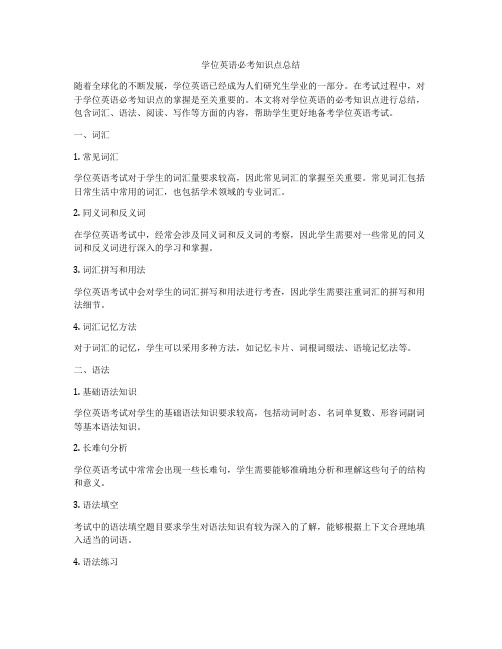
学位英语必考知识点总结随着全球化的不断发展,学位英语已经成为人们研究生学业的一部分。
在考试过程中,对于学位英语必考知识点的掌握是至关重要的。
本文将对学位英语的必考知识点进行总结,包含词汇、语法、阅读、写作等方面的内容,帮助学生更好地备考学位英语考试。
一、词汇1. 常见词汇学位英语考试对于学生的词汇量要求较高,因此常见词汇的掌握至关重要。
常见词汇包括日常生活中常用的词汇,也包括学术领域的专业词汇。
2. 同义词和反义词在学位英语考试中,经常会涉及同义词和反义词的考察,因此学生需要对一些常见的同义词和反义词进行深入的学习和掌握。
3. 词汇拼写和用法学位英语考试中会对学生的词汇拼写和用法进行考查,因此学生需要注重词汇的拼写和用法细节。
4. 词汇记忆方法对于词汇的记忆,学生可以采用多种方法,如记忆卡片、词根词缀法、语境记忆法等。
二、语法1. 基础语法知识学位英语考试对学生的基础语法知识要求较高,包括动词时态、名词单复数、形容词副词等基本语法知识。
2. 长难句分析学位英语考试中常常会出现一些长难句,学生需要能够准确地分析和理解这些句子的结构和意义。
3. 语法填空考试中的语法填空题目要求学生对语法知识有较为深入的了解,能够根据上下文合理地填入适当的词语。
4. 语法练习对于语法知识的掌握,学生可以通过大量的练习来加强自己的掌握程度。
可以选择一些语法练习册或者网上的资源进行练习。
三、阅读1. 阅读理解学位英语考试中的阅读理解题目要求学生能够准确地理解文章中的主旨和细节,并能够准确回答相关问题。
2. 阅读速度在考试中,学生需要具备较快的阅读速度,能够在有限的时间内阅读完考试文章。
3. 题型分析学位英语考试中的阅读题型主要有多选题、判断题、填空题等,学生需要对各种题型进行深入的了解。
4. 阅读训练对于阅读理解的训练,学生可以选择一些精选的阅读材料进行练习,提高自己的阅读能力。
四、写作1. 写作结构在学位英语考试中,写作的结构和逻辑性很重要,学生需要掌握好文章的开头、中间和结尾部分。
学时学位英语词汇及语法
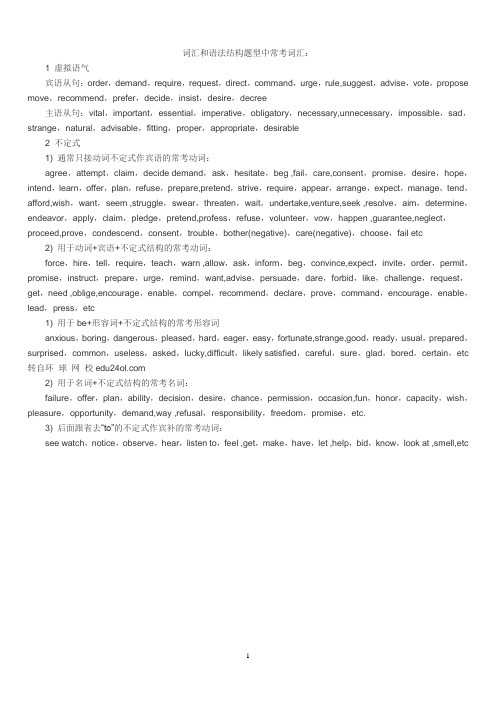
词汇和语法结构题型中常考词汇:1 虚拟语气宾语从句:order,demand,require,request,direct,command,urge,rule,suggest,advise,vote,propose move,recommend,prefer,decide,insist,desire,decree主语从句:vital,important,essential,imperative,obligatory,necessary,unnecessary,impossible,sad,strange,natural,advisable,fitting,proper,appropriate,desirable2 不定式1) 通常只接动词不定式作宾语的常考动词:agree,attempt,claim,decide demand,ask,hesitate,beg ,fail,care,consent,promise,desire,hope,intend,learn,offer,plan,refuse,prepare,pretend,strive,require,appear,arrange,expect,manage,tend,afford,wish,want,seem ,struggle,swear,threaten,wait,undertake,venture,seek ,resolve,aim,determine,endeavor,apply,claim,pledge,pretend,profess,refuse,volunteer,vow,happen ,guarantee,neglect,proceed,prove,condescend,consent,trouble,bother(negative),care(negative),choose,fail etc2) 用于动词+宾语+不定式结构的常考动词:force,hire,tell,require,teach,warn ,allow,ask,inform,beg,convince,expect,invite,order,permit,promise,instruct,prepare,urge,remind,want,advise,persuade,dare,forbid,like,challenge,request,get,need ,oblige,encourage,enable,compel,recommend,declare,prove,command,encourage,enable,lead,press,etc1) 用于be+形容词+不定式结构的常考形容词anxious,boring,dangerous,pleased,hard,eager,easy,fortunate,strange,good,ready,usual,prepared,surprised,common,useless,asked,lucky,difficult,likely satisfied,careful,sure,glad,bored,certain,etc 转自环球网校2) 用于名词+不定式结构的常考名词:failure,offer,plan,ability,decision,desire,chance,permission,occasion,fun,honor,capacity,wish,pleasure,opportunity,demand,way ,refusal,responsibility,freedom,promise,etc.3) 后面跟省去“to”的不定式作宾补的常考动词:see watch,notice,observe,hear,listen to,feel ,get,make,have,let ,help,bid,know,look at ,smell,etcabandon v.放弃,抛弃aboard ad.在船(飞机、车)上prep.在(船、飞机、车)上上(船、飞机、车)about to do 即将…bring sth.about 使发生about face 向后转;(态度,意见等)大转变How about…?表示访问,…怎么样?What about…? 表示询问,…怎么样?…好吗?…好吗?Above prep.在…上面,超过a.上面的,上述的ad.在上面above oneself 过于自信,兴高采烈abroad ad.国外,海外at home and abroad/国内外absence/n.缺席,不在场;+ absent/a.缺席,不在场,缺乏的;漫不经心的absent-mined 心不在焉的,出神的absolute/a.绝对的,完全的;(语法)独立的absorb v.吸收(水、热、光等)吸取,接受(知识、意见等)be absorbed in 专心于abundant 丰富的,充分的academic 学院的,学术的accent n.腔调,口音n.重音,重音符号accept v.接受,认可access n.接近,进入,通路have an access to 进入There is an access to…有一条通向…的通道accident n.事故n.意外的事,偶然的事by accident 偶然、无意中road 交通事故accompany v.陪伴,伴随,伴奏accomplish v.完成(任务等)according (只用于下列两个习语中)according to 按照,根据according as+从句根据…而…按照…而…accordingly ad.因此,从而,相应地;照着(办、做等)account n.账,账目,账户v.说明,解释(for)on account of=because of 因为,由于take(no)account of (不)考虑,(不)重视on one’s own account为自己的利益,独立地,自行担负责任accuracy n.准确,精密(性)accurate a.准确的,精确的accuse v.谴责v.指控,告发accuse sb.of sth.指责、控告某人,某事。
学位英语知识点

学位英语知识点学位英语是指为了获得硕士或博士学位而进行的英语应用能力考试。
它是一种专业性较强的英语应试考试,主要用来评估学生在英语听说读写能力方面的水平,以及对专业知识的运用能力。
下面是学位英语的知识点。
1.语法和词汇:学位英语考试中,语法和词汇是基础知识点。
学生需要对各种语法规则(如时态、语态、虚拟语气等)和常用词汇(如同义词、反义词、近义词等)有一定的掌握和应用能力。
2.阅读理解:学位英语考试中的阅读题主要考察学生的阅读理解能力。
学生需要能够理解文章的主旨和中心思想,掌握文章的逻辑结构和关键词汇,熟练运用推理和推测的能力。
3.写作能力:学位英语考试中的写作题主要考察学生的写作能力。
学生需要能够准确地表达自己的观点和观点,组织好文章的结构和段落,运用丰富的词汇和合适的语法结构,写作流畅、连贯。
4.听力理解:学位英语考试中的听力题主要考察学生的听力理解能力。
学生需要听懂英语对话或独白中的关键信息,理解说话者的态度和意图,掌握说话者的语速和语调,熟练运用听力推测和推理的能力。
5.口语表达:学位英语考试中的口语题主要考察学生的口语表达能力。
学生需要能够流利地表达自己的观点和观点,正确使用语法和词汇,使用适当的口语表达方式和技巧,与考官进行有效的交流。
6.专业知识:学位英语考试中的专业知识题主要考察学生对其中一学科的掌握和理解。
学生需要了解该学科的基本概念、原理和理论,掌握学科的基本知识和应用能力。
为了提高学位英语的考试成绩,学生可以通过以下方式进行备考:1.扩大词汇量:学生可以通过背单词、学习词根词缀、阅读英文文献等方式扩大自己的词汇量。
2.增加阅读量:学生可以通过阅读英文报刊、杂志、学术论文等方式提高自己的阅读理解能力。
3.学习语法:学生可以通过学习语法书籍、参加语法课程等方式加强自己的语法知识。
4.熟悉题型:学生可以通过做模拟题、参加模拟考试等方式熟悉考试题型,提高应试能力。
5.提高口语能力:学生可以通过参加口语训练班、与外国人交流等方式提高口语表达能力。
学位英语核心单词

学位英语核心单词学位英语核心单词是指为了通过成人高等教育本科英语考试或者其它与学位挂钩的英语水平测试,考生需要重点掌握的一系列词汇。
这些词汇通常涵盖了基础语法、学术阅读、写作、听说等各个方面所需的高频词汇和特定主题领域内的专业术语。
以下是一些示例性的学位英语核心单词:1. abandon [ə'bændən]2. ability [ə'bɪləti]3. abroad [ə'brɔːd]4. absence [ˈæbsəns]5. accommodate [ə'kɒmədeɪt]6. achievement [ə'tʃiːvmənt]7. analyze ['ænəlaɪz]8. argument ['ɑːgjʊm(ə)nt]9. academic [ækə'demɪk]10. cooperate [kəʊˌɒpəreɪt]11. dissertation [ˌdɪsəˈteɪʃ(ə)n]12. empirical [ɪmˈpɪrɪkl]13. hypothesis [haɪˈpɒθəsɪs]14. integrity [ɪnˈteɡrɪti]15. methodology [ˌmeθəˈdɒlədʒi]16. phenomenon [fəˈnɒmɪnən]17. quantitative [ˈkwæntɪtətɪv]18. research [rɪˈsɜːtʃ]19. significant [sɪɡˈnɪfɪk(ə)nt]20. summarize ['sʌməraɪz]准备学位英语考试时,建议学习者结合历年真题、大纲以及专门针对学位英语的核心词汇书进行系统学习,并结合实际语境记忆和运用这些词汇,以提高语言应用能力及应试成绩。
同时,由于不同地区或院校可能会有不同的考试要求和标准,请根据具体的考试指南进行复习。
自考学士学位英语考试复习资料(语法词汇短词阅读作文)
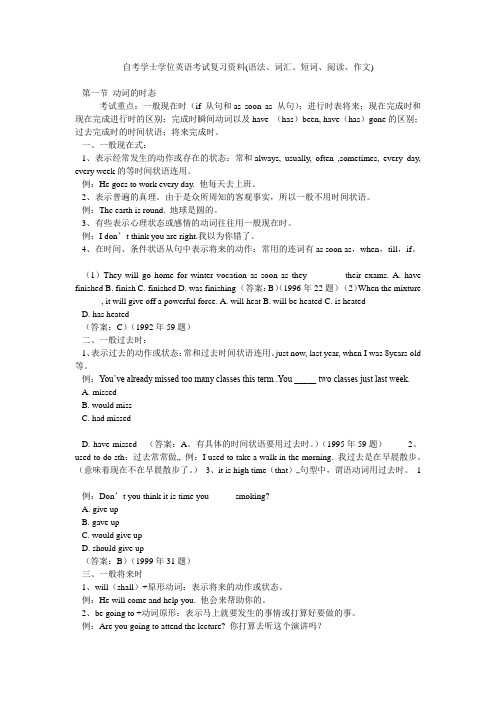
自考学士学位英语考试复习资料(语法、词汇、短词、阅读、作文)第一节动词的时态考试重点:一般现在时(if 从句和as soon as 从句);进行时表将来;现在完成时和现在完成进行时的区别;完成时瞬间动词以及have (has)been, have(has)gone的区别;过去完成时的时间状语;将来完成时。
一、一般现在式:1、表示经常发生的动作或存在的状态:常和always, usually, often ,sometimes, every day, every week的等时间状语连用。
例:He goes to work every day. 他每天去上班。
2、表示普遍的真理。
由于是众所周知的客观事实,所以一般不用时间状语。
例:The earth is round. 地球是圆的。
3、有些表示心理状态或感情的动词往往用一般现在时。
例:I don’t think you are right.我以为你错了。
4、在时间、条件状语从句中表示将来的动作:常用的连词有as soon as,when,till,if。
(1)They will go home for winter vocation as soon as they ________their exams. A. have finished B. finish C. finished D. was finishing (答案:B)(1996年22题)(2)When the mixture ______, it will give off a powerful force. A. will heat B. will be heated C. is heatedD. has heated(答案:C)(1992年59题)二、一般过去时:1、表示过去的动作或状态:常和过去时间状语连用。
just now, last year, when I was 8years old 等。
学位英语考试真题及答案解析(一)
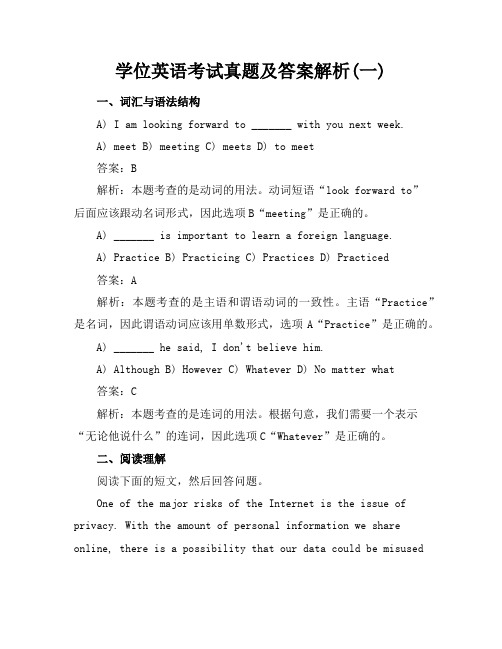
学位英语考试真题及答案解析(一)一、词汇与语法结构A) I am looking forward to _______ with you next week.A) meet B) meeting C) meets D) to meet答案:B解析:本题考查的是动词的用法。
动词短语“look forward to”后面应该跟动名词形式,因此选项B“meeting”是正确的。
A) _______ is important to learn a foreign language.A) Practice B) Practicing C) Practices D) Practiced答案:A解析:本题考查的是主语和谓语动词的一致性。
主语“Practice”是名词,因此谓语动词应该用单数形式,选项A“Practice”是正确的。
A) _______ he said, I don't believe him.A) Although B) However C) Whatever D) No matter what答案:C解析:本题考查的是连词的用法。
根据句意,我们需要一个表示“无论他说什么”的连词,因此选项C“Whatever”是正确的。
二、阅读理解阅读下面的短文,然后回答问题。
One of the major risks of the Internet is the issue of privacy. With the amount of personal information we share online, there is a possibility that our data could be misusedor stolen. It is important for us to be cautious and take necessary measures to protect our privacy.Another challenge is the spread of misinformation. The Internet allows anyone to publish information, which meansthat not all of it is reliable or accurate. It is crucial for us to develop critical thinking skills and verify the sources of information before accepting it as true.In conclusion, while the Internet has its risks and challenges, it is an indispensable tool in our modern society. By being aware of these risks and taking necessary precautions, we can fully enjoy the benefits it offers.A) The Internet has only brought disadvantages to our lives.B) It is not important to protect our privacy online.D) The Internet has provided us with a vast amount of information.答案:D解析:根据短文一段的内容,我们可以得知选项D是正确的,因为短文提到互联网为我们提供了大量的信息。
学位英语 1.词汇与语法复习资料

复习资料说明1.山东省学士学位英语考试于10月17-18日举行,具体时间以准考证为准2.考试形式为机考,随机抽题3.为满足同学们复习备考需求,学校根据学位英语考试大纲编写了本复习资料,但并非题库,请大家以提升英语水平和答题技巧为主词汇与语法第一部分1. If I had the time, I on a holiday like that in Spain.A. would goB. would have goneC. had goneD. will go2. You should that there are no grammar and spelling mistakes in your essay.A. look outB. find outC. make sureD. keep aware3. Just leave your bags there and I’ll the porter to carry them to your room.A. makeB. haveC. letD. get4. Visitors from the US have increased 8 percent since last year.A. inB. byC. withD. from5. The hotel was reasonably comfortable but the food lacked and the service was poor.A. energyB. standardC. varietyD. heat6. As a place where east west, Berlin is one of the busiest cities in the world.A. beatsB. meetsC. reachesD. switches7. If you were the general manager of the company, what would you do the current situation?A. to improveB. improvingC. to have improvedD. having improved8. It was a rush but we arrived just —a few minutes later and we'd have missed the flight.A. behind timeB. on timeC. in timeD. well ahead of time9. We had to wait in line for 30 minutes because only a few clients were allowed in .A. at one timeB. at all timesC. at certain timesD. at no time10. If the current continues, our country may turn out to be the world's largest economy by 2020.A. recoveryB. eventC. potentialD. trend11. The historical church was damaged in a fire attack on 21Dec.,2007.A. intensivelyB. extensivelyC. decisivelyD. repeatedly12. Women are better than men at detecting sweet, sour, salty, biter tastes.A. thanB. orC. asD. and13. She has a very good command of both German and French, and is now learning foreign language.A. anotherB. the otherC. otherD. any other14. We can’t emphasize the importance of air and water for the survival of al species.A. very muchB. too muchC. pretty muchD. quite much15. While being questioned on the court, the man denied the old lady’s necklace.A. takingB. having takenC. to have takenD. to take16. Not until a monkey is several years old to exhibit signs of independence from its mother.A.it does beginB. when it beginsC. does it beginD. before it begins17. Although happened in the developed country sounds like science fiction, it could occur elsewhere in the world.A. whichB. whatC. howD. it18. During the last three decades, the number of people participating in physical fitness programs sharply.A. has increasedB. were increasingC. had increasedD. have increased19. She is quite rich money. However, this does not mean that she is happy.A.in spite ofB.in favor ofC.in terms ofD.in case of20. As the train will not leave until one hour later, we grab a bite at the snack bar.A. may wellB. just as wellC. as wellD. might as well1.【解析】A本题考查虚拟语气。
学位英语语法详细讲解

学位英语语法基础知识:句法分析1、主语:是句子要说明的人或物,可以作主语的成分有名词,主语一般在句首。
注意名词单数形式常和冠词不分家!1)Mr. Lee is a well-known scientist. 名词作主语2)He reads newspapers everyday. 代词作主语3)Two and ten is twelve. 数词作主语4)Smoking is harmful to the health. 动名词作主语5)To swim in that pool is a great pleasure. 动词不定式作主语6)What we shall do next is not yet decided. 从句作主语2、谓语:说明主语的动作,状态或特征1)The new term begins on the 1st of September.2)His father is an engineer.3)She seemed happy.4)Li Hua showed me his album.3、宾语:指的是及物动词涉及到的人或物1)Wang Ling lent me a novel to read in the bus.2)The medicine is good for a cold.3)How many pieces do you want?4)My little sister always likes to ask questions.5)Would you mind coming earlier tomorrow?6)He asked me what I was going to do tonight4、宾语补足语:在宾语后面补充说明宾语的动作、状态、特征。
1)The government appointed(任命)her chief delegate (首席代表)to the conference.2)I don‘t believe the story true.3)You should put your things in order(有序).4)The doctor advised her to stay in bed for a week.5)We saw the pupils playing basketball.5、表语:位于系动词如be之后,说明主语身份,特征,属性或状态。
学位英语+语法+词汇

语法常考词汇1.虚拟语气1)用于宾语从句,从句谓语用should + 动词原形或只用动词原形。
这类动词有 order, demand, require, request requested (被请求的), direct, instruct (教导,命令), command (命令,指挥), urge (催促,促进), rule, suggest suggested (暗示的), advise (劝告,警告), vote (选举,表决), propose (提议,建议),proposed (被提议的), move, recommend (劝告,介绍), prefer, decide decided, insist (坚持,强烈要求), desire (愿望,欲望,要求),desired (渴望的,想得到的).2)用于主语从句,从句谓语用should + 动词原形或只用动词原形。
这类动词有: vital (重要的,致命的), important, essential (必不可少的,必要的), necessary (必定,当然),unnecessary (不必要的,多余的), impossible (不可能的,做不到的), sad, strange (奇怪的,陌生的), fitting (适应,配合), proper (适当的,特有的), appropriate (适合的,恰当的), settled (固定的).2.不定式1) 通常只接动词不定式作宾主的常考动词:agree, attempt (试图,努力), claim (主张,断言), decide, demand (要求,需要), ask, beg (乞讨,请求), fail (失败,忘记), care, consent (同意,答应), promise (答应,有希望), desire, hope, intend (想要,打算,企图), learn, offer (提供,提议), plan (设计), refuse, pretend (假装), require, appear (好像是,仿佛), arrange, expect, manage, tend (倾向,照料), afford (供给,担负得起), wish, want, seem (好像,仿佛), struggle (斗争), threaten (威胁), wait, undertake (接受,承担), venture (冒险,敢于), seek (寻找,试图), resolve (决议,解决), aim (志在,瞄准), apply (申请,运用), profess. (表示), happen, guarantee (保证),neglect (疏忽,忽略), prove (证明,结果), trouble (打扰,费神), bother (打扰,麻烦), care (关心,喜欢), choose (选择,甘愿), etc.2) 用于动词+宾语+不定式结构的常考动词:force (强迫,迫使), hire (雇佣,租借), tell, require, teach (教书,教训), warn (警告), allow, ask, inform(通知,告发) beg, convince (使信服,使确信), expect, invite (邀请,招待), order, permit (允许,许可), promise (允许,答应), instruct (指示,命令), prepare (准备,预备), urge (鼓励,促进), remind (提醒), want, advise (忠告,通知), persuade (说服,使相信), cause (引起), dare (敢,胆敢), forbid (禁止), like, challenge (挑战), request, get, need, oblige (迫使,使感激), encourage (鼓励,促进), enable (使能够), compel (强迫,逼迫), recommend (劝告,推荐), declare (宣布,表明), prove (证明,鉴定), command (命令,指挥), lead (引导,带领), press (压,挤), etc.3) 用于be+形容词+不定式结构的常考动词:anxious (担心的,渴望的), dangerous (危险的,不安全的), pleased (高兴的,满足的), hard , eager (热心的,渴望的), easy, fortunate (幸运地,侥幸的), strange (奇怪的,陌生的), good, ready (现成的,情愿的), usual (通常的), prepared, surprised (感到惊讶的), common (普通的,公共的), useless (无用的,), asked , lucky, difficult (困难的,艰难的), likely (可能的,), careful (小心的,仔细的), sure (确信的,一定的), glad (高兴的,愉快的), sorry (难过的,悔恨的), bored (无聊的,烦人的), able, free, quick, willing., determined, afraid. etc.4) 用于名词+不定式结构的常考名词:failure (失败者), offer (提供,提议), plan, ability (能力,才能), decision (决定,果断), desire(愿望,要求), chance, permission (许可,允许), occasion (场合,时节), fun (玩笑), honor (荣誉,尊敬), wish, pleasure, opportunity, demand (要求,需求), way, refusal (拒绝,推辞), responsibility (责任,职责), freedom (自由,自主), promise, etc.5) 后面跟省去“to” 的不定式作宾补的常考动词:see,watch, notice (注意,通告), observe (遵守,注意到), hear, listen to, feel (感觉,认为),get,make, have, let, help, know, look at, smell. etc.6) 表结果的短语+不定式:so…as to…, such…as to…, enough to…, only to…, too…to…3.动名词:1) 通常只接动名词作宾语的动词:admit (承认,接纳), appreciate (感激,评价), avoid (避免,逃避), delay (推迟,延误), deny (否认,), enjoy, finish, miss, postpone (推迟,延期), put off (拖延), practice, quit (离开,停止), suggest, keep, complete (完成,结束), anticipate (期望,预料), discuss, understand, favor(喜爱,帮助), escape (逃避,避免), forgive, consider, prohibit (禁止,不准), mind, dislike, can’t help(禁不住), risk, involve, imagine (想象), look forward to (期望,盼望), can’t stand (不能忍受), consider, ensure, excuse, pardon, give up (放弃), include, keep on (遵守), report, suggest. involve, etc.2) 常跟动名词作宾语的动词短语:approve of (赞成), insist on (坚持,强调), persist in, spend in ,engage in (从事), depend on, keep on, rely on (依靠,信赖), worry about, succeed in, give up, calculate on (计算), lead to(通向,导致), contribute to (有助于), devote to (献身,投入), object to (反对), look forward to, confess to (承认), concentrate on(集中于), focus on (使集中于), etc.3) 用于“名词+介词+动名词”结构的名词:pleasure in (以…为乐), opportunity of (…的机会), advise on (就…提出劝告), method for(…的方法), excuse for (…的借口), intention of (…的目的,意图), probability of (…的可能性), concern about (对…的关心), difficulty in (限于…的困境), trouble in (遇到…的麻烦), shortage of (…的不足), comment on (…的评论), importance of (…的重要性), necessity of (…的需要), approach to (接近/探讨…), etc.4) 用于“be+形容词+介词+动名词”结构的形容词:accustomed to (习惯于…), afraid of (害怕…), fond of (对…的喜爱), successful in (在某方面的成功), capable of (有…的能力), tired of (厌烦做某事), interested in, intent on (在某方面的打算), keep on, used to, good at, particular about (…的细节), bent on (致力于….), engaged in (从事于/忙于做某事), involved in (限入), devoted to (把…奉献给,专心于…),etc.5) 动词后可跟原形动词和动名词::+do/doingdiscover (发现,发觉), feel, find, force (强迫,迫使), get, imagine (想像,假想), etc..6)v.+sb. into doing:,动词有:cheat (欺骗), trick (欺骗,哄骗), deceive (欺骗), fool(愚弄), shame (侮辱),surprise(惊讶,吃惊), talk.etc.7)v.+sb. from doing,动词有:prevent, stop, keep, hinder(阻碍), restrain(抑制), save(拯救,节省[学位英语]词汇题答题技巧2009-07-13 18:15:17| 分类:英语词汇| 标签:|字号大中小订阅由于《大纲》强调要在语篇层次上解决语法与词汇问题,所以学位英语考试的这部分试题也很少是单个的句子,大多为并列句或复合句,因此我们也应学会根据语篇知识来掌握答题技巧,尤其是要注意句子之间的解释、对比、转折、因果等关系。
成人本科学士学位英语语法集锦
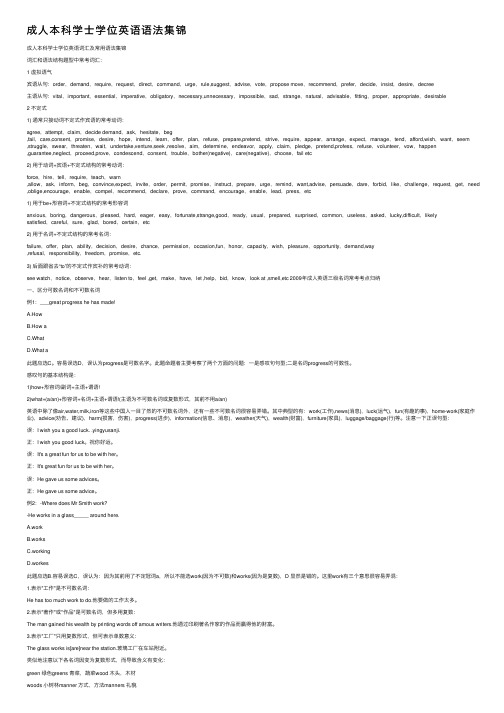
成⼈本科学⼠学位英语语法集锦成⼈本科学⼠学位英语词汇及常⽤语法集锦词汇和语法结构题型中常考词汇:1 虚拟语⽓宾语从句:order,demand,require,request,direct,command,urge,rule,suggest,advise,vote,propose move,recommend,prefer,decide,insist,desire,decree主语从句:vital,important,essential,imperative,obligatory,necessary,unnecessary,impossible,sad,strange,natural,advisable,fitting,proper,appropriate,desirable2 不定式1) 通常只接动词不定式作宾语的常考动词:agree,attempt,claim,decide demand,ask,hesitate,beg,fail,care,consent,promise,desire,hope,intend,learn,offer,plan,refuse,prepare,pretend,strive,require,appear,arrange,expect,manage,tend,afford,wish,want,seem,struggle,swear,threaten,wait,undertake,venture,seek ,resolve,aim,determine,endeavor,apply,claim,pledge,pretend,profess,refuse,volunteer,vow,happen,guarantee,neglect,proceed,prove,condescend,consent,trouble,bother(negative),care(negative),choose,fail etc2) ⽤于动词+宾语+不定式结构的常考动词:force,hire,tell,require,teach,warn,allow,ask,inform,beg,convince,expect,invite,order,permit,promise,instruct,prepare,urge,remind,want,advise,persuade,dare,forbid,like,challenge,request,get,need ,oblige,encourage,enable,compel,recommend,declare,prove,command,encourage,enable,lead,press,etc1) ⽤于be+形容词+不定式结构的常考形容词anxious,boring,dangerous,pleased,hard,eager,easy,fortunate,strange,good,ready,usual,prepared,surprised,common,useless,asked,lucky,difficult,likelysatisfied,careful,sure,glad,bored,certain,etc2) ⽤于名词+不定式结构的常考名词:failure,offer,plan,ability,decision,desire,chance,permission,occasion,fun,honor,capacity,wish,pleasure,opportunity,demand,way,refusal,responsibility,freedom,promise,etc.3) 后⾯跟省去“to”的不定式作宾补的常考动词:see watch,notice,observe,hear,listen to,feel ,get,make,have,let ,help,bid,know,look at ,smell,etc 2009年成⼈英语三级名词常考考点归纳⼀、区分可数名词和不可数名词例1:___great progress he has made!A.HowB.How aC.WhatD.What a此题应选C。
学位英语词汇和语法技巧

学位英语词汇和语法技巧一、词汇部分。
1. 记忆方法。
- 词根词缀法。
- 例如,“un -”这个前缀通常表示否定。
像“happy(快乐的,幸福的,发音:[ˈhæpi],词性:形容词)”加上“un -”就变成“unhappy(不快乐的,发音:[ʌnˈhæpi],词性:形容词)”。
- 再如,“re -”这个前缀有“再次、重新”的意思。
“write(写,发音:[ra ɪt],词性:动词)”加上“re -”成为“rewrite(重写,发音:[ˌriːˈraɪt],词性:动词)”。
- 联想法。
- 对于单词“ambulance(救护车,发音:[ˈæmbjələns],词性:名词)”,可以联想成“俺不能死”,这样就很容易记住这个单词的发音和意义。
- 语境记忆法。
- 把单词放在句子或者短文语境中去记忆。
例如:“I like to eat an apple (我喜欢吃一个苹果,其中“apple”发音:[ˈæpl],词性:名词) every day. ”通过这个句子,不仅记住了“apple”这个单词,还学会了它的用法。
2. 词汇辨析。
- 近义词辨析。
- “look”“see”和“watch”- “look(看,发音:[lʊk],词性:动词)”强调看的动作,通常是有意识地看,后面常接介词“at”,如“Look at the blackboard(看黑板)”。
- “see(看见,发音:[siː],词性:动词)”强调看的结果,例如“I can see a bird in the tree(我能看见树上有一只鸟)”。
- “watch(观看,注视,发音:[wɒtʃ],词性:动词)”通常指观看动态的事物,如“watch TV(看电视)”或者“watch a football game(观看一场足球比赛)”。
- 形近词辨析。
- “quite(很,非常,发音:[kwaɪt],词性:副词)”和“quiet(安静的,发音:[ˈkwaɪət],词性:形容词)”。
学位英语重点复习资料

学位英语重点复习资料一、词汇与语法1、词汇:积累词汇量是英语学习的关键。
复习时,应注重对常用词汇的理解和应用。
记忆单词的方法可以是结合语境进行记忆,这样更有利于理解和记忆。
2、语法:语法是英语学习的另一重要部分。
复习时,应注重对各种语法规则的理解和应用,尤其是时态、语态、从句等高级语法。
二、阅读理解阅读理解是学位英语考试的重要部分,复习时应注意提高阅读速度和理解能力。
可以通过阅读英文文章、新闻报道、学术论文等来提高阅读理解能力。
同时,学会根据上下文理解文章的意思,注意总结文章主旨和结构。
三、写作与翻译1、写作:写作部分要求考生能够写出结构清晰、语法正确的英语文章。
复习时,可以练习写作各种类型的文章,如议论文、说明文、记叙文等。
注意提高写作的逻辑性和条理性。
2、翻译:翻译部分要求考生能够准确地将英文翻译成中文。
复习时,可以多做一些翻译练习,注意对英文句子结构和含义的理解。
四、听力与口语1、听力:听力部分要求考生能够听懂英语口语中的常用表达和基本对话。
复习时,可以听一些英语新闻、电影、讲座等来提高听力理解能力。
2、口语:口语部分要求考生能够用英语进行基本的交流和表达。
复习时,可以与英语母语者进行对话练习,或者通过英语角等活动来提高口语表达能力。
以上是学位英语重点复习资料,希望能够帮助大家更好地准备考试。
祝大家成功!复习资料电大本科学位英语复习资料标题:复习资料:电大本科学位英语复习资料一、考试概述电大本科学位英语考试旨在测试学生的英语综合能力,包括词汇、语法、阅读理解、写作和听力。
考试形式为闭卷笔试,总分为100分,及格分数为60分。
了解考试大纲和题型,有针对性地进行复习,是提高考试成绩的关键。
二、词汇复习词汇是英语学习的基础,也是学位英语考试的重要部分。
复习时,建议采取以下策略:1、制定复习计划,每天背诵一定数量的单词,包括课内和课外的重点词汇。
2、运用记忆规律,如艾宾浩斯曲线,进行复习和巩固,提高记忆效果。
成人学士学位英语词汇汇总

成人学士学位英语词汇汇总以下是一些成人学士学位英语词汇的汇总:1. Bachelor's degree - 学士学位2. Major - 专业3. Minor - 辅修4. Credit - 学分5. Semester - 学期6. Elective - 选修课7. Core courses - 必修课程8. Graduate - 毕业9. Coursework - 课程作业10. Thesis - 毕业论文11. Dissertation - 博士论文12. GPA (Grade Point Average) - 平均绩点13. Transcript - 成绩单14. Academic advisor - 学术指导员15. Graduation ceremony - 毕业典礼16. Honors - 荣誉17. Cum laude - “优等生”,学业成绩优秀毕业生荣誉称号18. Magna cum laude - “优等生”,学业成绩优秀毕业生荣誉称号19. Summa cum laude - “优等生”,学业成绩优秀毕业生荣誉称号20. Transcript - 毕业证书21. Diploma - 学位证书22. Alumni - 校友23. Faculty - 教职员工24. Research - 研究25. Internship - 实习26. Capstone project - 顶级项目27. Prerequisite - 先决条件28. Enrollment - 注册29. Academic calendar - 学年月历30. Online learning - 在线学习。
学位英语知识点复习资料【优秀4篇】
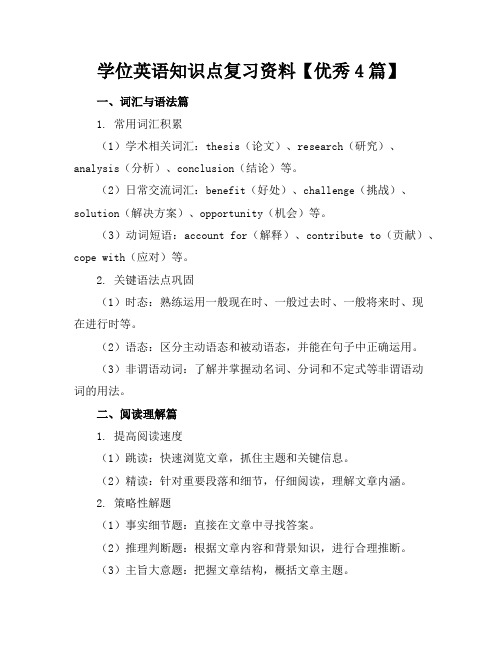
学位英语知识点复习资料【优秀4篇】一、词汇与语法篇1. 常用词汇积累(1)学术相关词汇:thesis(论文)、research(研究)、analysis(分析)、conclusion(结论)等。
(2)日常交流词汇:benefit(好处)、challenge(挑战)、solution(解决方案)、opportunity(机会)等。
(3)动词短语:account for(解释)、contribute to(贡献)、cope with(应对)等。
2. 关键语法点巩固(1)时态:熟练运用一般现在时、一般过去时、一般将来时、现在进行时等。
(2)语态:区分主动语态和被动语态,并能在句子中正确运用。
(3)非谓语动词:了解并掌握动名词、分词和不定式等非谓语动词的用法。
二、阅读理解篇1. 提高阅读速度(1)跳读:快速浏览文章,抓住主题和关键信息。
(2)精读:针对重要段落和细节,仔细阅读,理解文章内涵。
2. 策略性解题(1)事实细节题:直接在文章中寻找答案。
(2)推理判断题:根据文章内容和背景知识,进行合理推断。
(3)主旨大意题:把握文章结构,概括文章主题。
三、完形填空篇1. 培养语感2. 注意上下文联系在解题过程中,关注上下文之间的联系,尤其是代词、转折词等。
四、写作篇1. 提高写作能力(1)积累素材:多阅读优秀文章,学习写作技巧。
(2)模拟练习:针对不同题型,进行模拟练习。
2. 熟悉写作模板学位英语知识点复习资料【优秀4篇】三、听力理解篇1. 提升听力技巧(1)预测能力:在听前根据题目和选项预测对话或短文的内容。
(2)关键词定位:在听的过程中,关注关键词,如数字、专有名词等,以便抓住关键信息。
2. 培养日常听力习惯(1)多听英语广播、新闻、电影等,提高对不同口音和语速的适应能力。
四、翻译篇1. 掌握翻译技巧(1)直译与意译相结合:根据语境灵活运用直译和意译。
(2)词汇准确:确保翻译的词汇准确无误,符合原文含义。
学位英语词汇和语法常考词汇

学位英语词汇和语法常考词汇1 虚拟语气宾语从句:order,demand,require,request,direct,command,urge,rule,suggest,advise,vote,propose move,recommend,prefer,decide,insist,desire,decree主语从句:vital,important,essential,imperative,obligatory,necessary,unnecessary,impossible,sad,strange,natural,advisable,fitting,proper,appropriate,desirable2 不定式1)通常只接动词不定式作宾语的常考动词:agree,attempt,claim,decide demand,ask,hesitate,beg ,fail,care,consent,promise,desire,hope,intend,learn,offer,plan,refuse,prepare,pretend,strive,require,appear,arrange,expect,manage,tend,afford,wish,want,seem ,struggle,swear,threaten,wait,undertake,venture,seek ,resolve,aim,determine,endeavor,apply,claim,pledge,pretend,profess,refuse,volunteer,vow,happen ,guarantee,neglect,proceed,prove,condescend,consent,trouble,bother(negative),care(negative),choose,fail etc2)用于动词+宾语+不定式结构的常考动词:force,hire,tell,require,teach,warn ,allow,ask,inform,beg,convince,expect,invite,order,permit,promise,instruct,prepare,urge,remind,want,advise,persuade,dare,forbid,like,challenge,request,get,need ,oblige,encourage,enable,compel,recommend,declare,prove,command,encourage,enable,lead,press,etc1)用于be+形容词+不定式结构的常考形容词anxious,boring,dangerous,pleased,hard,eager,easy,fortunate,strange,good,ready,usual,prepared,surprised,common,useless,asked,lucky,difficult,likely satisfied,careful,sure,glad,bored,certain,etc2)用于名词+不定式结构的常考名词:failure,offer,plan,ability,decision,desire,chance,permission,occasion,fun,honor,capacity,wish,pleasure,opportunity,demand,way ,refusal,responsibility,freedom,promise,etc.3)后面跟省去“to”的不定式作宾补的常考动词:see watch,notice,observe,hear,listen to,feel ,get,make,have,let ,help,bid,know,look at ,smell,etc成人本科学位英语考试,我们学习词汇时应注意容易混淆的词。
学位英语词汇和语法策略

学位英语词汇和语法策略学位英语是大学生在学习过程中必修的一门课程,主要针对英语的听力、阅读、写作以及词汇和语法等方面进行训练。
其中,词汇和语法是学习英语的基础,对于提高整体英语水平至关重要。
本文将介绍一些学位英语中常用的词汇和语法策略,帮助大家更好地掌握这门课程。
一、词汇策略1. 词汇量的积累在学习英语中,词汇量的积累是非常重要的。
可以通过背单词、阅读英语原著、听英语音频或者使用词汇记忆APP等方式进行词汇的积累。
此外,记得要注重词汇的灵活运用,可以通过造句或者语境训练等方法提升词汇的实际应用能力。
2. 词汇记忆技巧为了更好地记忆词汇,可以运用以下几个技巧:a. 使用联想记忆法:将生词与熟悉的词汇或者形象进行联想,帮助记忆。
b. 创造语境:将生词放入具体的语境中进行记忆,帮助理解和记忆。
c. 制定学习计划:每天安排一定的时间进行词汇学习,坚持下来可以有效提升词汇量。
3. 词义辨析在学位英语考试中,经常会出现一些相近词汇的辨析题。
为了顺利解答此类题目,需要加强对于词义的辨析能力。
可以通过查看词典、阅读相关文章等方式加深对词义的理解,并进行实际的应用练习。
二、语法策略1. 理解语法规则学习语法需要掌握和理解各种语法规则,包括句子结构、时态、语态、语气、虚拟语气等。
可以通过阅读教材和参考书籍,进行语法规则的学习和掌握。
此外,积累语法知识的同时,也要关注语法的实际应用,在实际写作和口语练习中加以巩固。
2. 句子结构的拓展为了使句子更加丰富多样,可以学习一些句子结构的拓展方法,如使用定语从句、状语从句、并列句等。
通过使用不同的句子结构,可以使句子的表达更加准确、丰富,提高整体语言的表达力。
3. 语法错误的纠正在学习英语过程中,经常会出现一些常见的语法错误,如动词时态、主谓一致、冠词使用等。
为了避免这些错误,可以结合练习题目进行有针对性的训练,同时多读多写英文文章,逐步提高自己的语法水平。
综上所述,词汇和语法是学位英语中必不可少的一部分。
学位英语词汇和语法
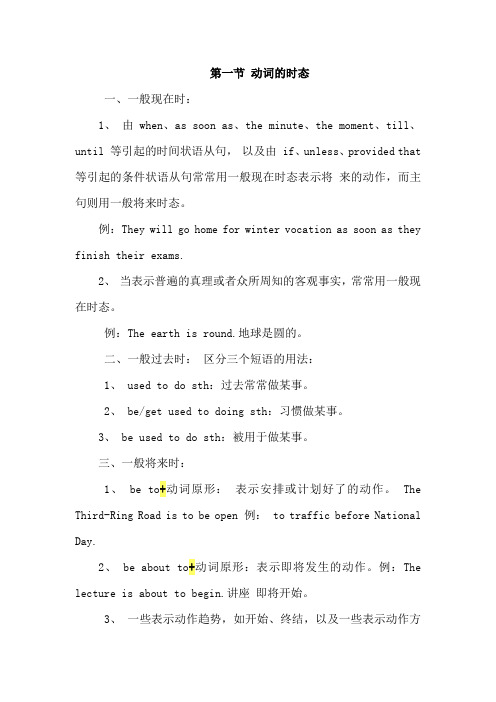
第一节动词的时态一、一般现在时:1、由 when、as soon as、the minute、the moment、till、until 等引起的时间状语从句,以及由 if、unless、provided that 等引起的条件状语从句常常用一般现在时态表示将来的动作,而主句则用一般将来时态。
例:They will go home for winter vocation as soon as they finish their exams.2、当表示普遍的真理或者众所周知的客观事实,常常用一般现在时态。
例:The earth is round.地球是圆的。
二、一般过去时:区分三个短语的用法:1、 used to do sth:过去常常做某事。
2、 be/get used to doing sth:习惯做某事。
3、 be used to do sth:被用于做某事。
三、一般将来时:1、 be to+动词原形:表示安排或计划好了的动作。
The Third-Ring Road is to be open 例: to traffic before National Day.2、 be about to+动词原形:表示即将发生的动作。
例:The lecture is about to begin.讲座即将开始。
3、一些表示动作趋势,如开始、终结,以及一些表示动作方向,如往来的动词,常常用现在进行时态表示按照安排将于将来发生的事情,这类动词常见的有如: start, go, leave, come, arrive 等。
例:We are leaving for Beijing tomorrow.我们明天动身去北京。
四、进行时态:重点区分 when 和 while 引起的时间状语的用法。
When 表示时间上的点,在考试中其引导的时间状语从句多翻译为“这时…” ,主句多用进行时态;while 引导的时间状语从句多翻译为“正当…时” ,该从句用进行时态。
- 1、下载文档前请自行甄别文档内容的完整性,平台不提供额外的编辑、内容补充、找答案等附加服务。
- 2、"仅部分预览"的文档,不可在线预览部分如存在完整性等问题,可反馈申请退款(可完整预览的文档不适用该条件!)。
- 3、如文档侵犯您的权益,请联系客服反馈,我们会尽快为您处理(人工客服工作时间:9:00-18:30)。
v 1) She sings quite well. v 2) On Sundays, there is no student in the classroom. v 3) He sits there, asking for a pen. v 4) The boy needs a pen to do his homework. v 5) If I have some spare time, I will read some story-books.
七、虚拟语气(我们要记住与现在,过去,将来 相反的三种情况,特别是与过去相反的情况最常 考,再有就是wish as if 后面所接的三种情况, 还有一个常考点在suggest,demand, require,order等表示建议,要求,命令的 词后面加从句时,从句里谓语要用(should) +动词原形,如果是被动则用(should +be +动词过去分词) 1、I would have done it better if I had had more time. 2、I wish you would go with us tomorrow.
6、定语:是对名词或代词起修饰、限定作用的词、 短语或句子,翻译常用‘……的’表示。 v Tom is a handsome boy. The two boys are students. v His boy needs Tom's pen. The boy in the classroom needs a pen of yours.
v There is nothing to do today. The smiling boy needs a pen bought by his mother. v This is the new dictionary which I bought yesterday. 7、状语:状语修饰动词、形容词、副词或全句, 说明方式、因果、条件、时间、地点、让步、 方向、程度、目的等。
学位英语考前辅导
语法、词汇
网络学院 2011.10.13
句法分析
1、主语:是句子要说明的人或物,可以作主语 的成分有名词,主语一般在句首。注意名词 单数形式常和冠词不分家! 1) Mr. Lee is a well-known scientist.名词 作主语 2) He reads newspapers everyday.代词 作主语 3) Two and ten is twelve.数词作主语 4) Smoking is harmful to the health.动 名词作主语
3、宾语:指的是及物动词涉及到的人或物 1) Wang Ling lent me a novel to read in the bus. 2) The medicine is good for a cold. 3) How many pieces do you want? 4) My little sister always likes to ask questions. 5) Would you mind coming earlier tomorrow? 6) He asked me what I was going to do tonight 4、宾语补足语:在宾语后面补充说明宾语的动作、状态、特 征。 1) The government appointed(任命)her chief delegate (首席代表)to the conference.
4、When Mr. Delay got home after a day's exhausting work,his wife and children were sleeping. 二、非谓语动词题(特别是现在分词与过时分词的区别, 大家一定要弄明白主动与被动这对最最重要的区别。) 1、The film showed last night was very moving. (不用moved,大家别忘了-ed形容词和-ing形容词的 区别) 2、Having finishing his lecture,the teacher asked if anyone wished to asked a question. 3、The problem being discussed is very important.
3、I suggest that we(should )adopt a different policy. 4、Had it not been for your help,we would never have been able to get over the difficulties. 八、情态动词题(除了掌握常见情态动词基本用 法外,常考点在三种表推测的情况,分别为 must表对现在事情的肯定推测 ,can't表对现 在事实的否定推测,must have +v-ed表示对 过去事实的肯定推测,而则表示过去应该做某 事而没有做)
2、The Nile river is the longest river in the world. 3、It is much too hot tonight. 4、The harder he worked,the happier he felt. 十、主谓一致题(往往出题者都是考谓语动词选 单数这种情况,如each,every,everyone这 样的词作主语以及Mary,like many other girls likes listening to music这样的题) 1、The moral of the officers and crew was very high.
4、Given more time,we are sure to finish it. 5、Will you please make yourself known to everyone here 三、It作形式主语及形式宾语题(这也是一个 常考点,it本身是没有意思的,注意it还可 以指时间,天气等。) 1、It is difficult to study English well. 2、We think it is important to pass the exam.
来自1、The ground is so wet,it must have rained last night. 2、She must be a doctor,I think. 3、I should have called you last week, but I was too busy then. 九、几组形容词及副词区别题(注意比较级、 最高级、倍数表达;likely possible probable;worth worthy;too much much too;already yet等) 1、His books are three time as many as my books.
5) To swim in that pool is a great pleasure.动词 不定式作主语 6) What we shall do next is not yet decided.从 句作主语 2、谓语: 说明主语的动作,状态或特征 1) The new term begins on the 1st of September. 2) His father is an engineer. 3) She seemed happy. 4) Li Hua showed me his album.
2) I don’t believe the story true. 3) You should put your things in order(有序). 4) The doctor advised her to stay in bed for a week. 5) We saw the pupils playing basketball.
四、强调句型(大家要记住的是it is (was)……。that…。如果前面是it is/was 后面往往选用that,当然强调人 的时候也可用who) 1、It was at an evening party that I first saw her. 2、It is what you will do that is important. 3、When was it that he bought a new car
8、同位语是在名词或代词之后并列名词或代 词对前者加以说明的成分,近乎于后置定语。 如: v We students should study hard. / (students是we的同位语,都是指 同一批‘学生’) v We all are students. / (all 是we的同位语,都指同样的‘我们’)
5、表语:位于系动词如be之后,说明主语身份,特征, 属性或状态。 1)Wang’s father is a doctor. 2) He is always careless. 3) The basketball match is on. 4) All the pupils are on the playground now.
5) Our aim is to win more medals. 6) His work is teaching French. 7) The question is who can really repair the machines. 还有位于以下系动词后面的词,我们也称之为表语: 表示感官的:look\seem(看起来) 、sound(听起来)、 smell(闻起来)、taste(尝起来)、feel(感觉起来) He looks disappointed(形容词作表语)他看起来很失望。 The rubbish smells terrible.垃圾很难闻。 表示变化的:get、become、turn(变得)。 It becomes hotter and hotter(形容词作表语)天变得越来 越热了。
